
This review may contain spoilers
"Those who had feelings were caught in them"
Donnie Yen starred in and directed Sakra, a wuxia based on Jin Yong’s novel Demi-Gods and Semi-Devils. As I haven’t read the book I’m only critiquing this movie as a stand-alone. Kiu Fung was a man who had to figure out who he was and what he stood for after tragedies and treacheries befell him.The infant Kiu Fung was left on the doorstep of a Song couple and grew up to be a master in the infamous Beggar Gang. After rescuing a caged young man from turning into a sacrifice he returns home only to be accused of murdering a fellow Beggar by the man’s wife. The wife also produces a letter revealing that Kiu is actually a Khitan, the most hated of enemies. He’s not given a chance to refute the “evidence” and ends up turning in his Dog Beating Staff. It goes downhill from there for Kiu as the bodies begin to rack up with everyone blaming him for the deaths. During one of the angry mob scenes, he rescues an injured thief and romance blossoms.
This was one of those movies where it was hard to like any of the characters. Donnie’s Kiu was a masterful fighter but came across as not terribly bright. He was framed and double-crossed on a routine basis. And when it was his turn to communicate and seek the truth he reacted like the Beggar Gang, Shaolin monks, and townspeople had and jumped to an illogical conclusion which led to deadly consequences. The rescued thief, Ah Zhu, had only one job-to be carried around and make big puppy eyes at Kiu.
Parts of the story needed to be explained better. Kiu had stood up for the downtrodden, sought to be moral at all times and yet everyone believed he could murder the people close to him. Was it jealousy? Or were they all simply awful people who refused to hear Kiu’s side of the story? The romance fell flat, partly because of the development on screen but also because the 60-year-old Yen was twice as old as his costar. He came across more paternal or perhaps as a kung fu master to her. I could see him feeling sorry for Ah Zhu and she in turn hero worshipping him, but romance didn’t come across on the screen. And while I’m at it, why would he ever think he could pass for thirty?
There were numerous fights as the world took on Kiu. I understand Yen is 60 and his body has taken enormous abuse through the years. It would make perfect sense to rely on camera tricks and stuntmen to sell the fights. What ended up on the screen were ridiculously undercranked/sped up moves as if The Flash and Quicksilver went at it. When fights are repeatedly sped up in martial arts movies, it usually means the moves were slow or missing their targets. I don’t mind light body work with people leaping and skipping over rooftops, but they seemed rather awkward here. Wuxia “magic” doesn’t bother me either except how many times can you watch people being blown through walls or floors before it becomes exceedingly redundant? I would normally enjoy watching Donnie pummel his opponents but the exciting brawls were few and far between in this one. It didn’t help that before one long drawn out fight, he had to have a drink with anyone who wanted to take him on---which turned out to be everyone. The scene dragged on interminably.
Sakra was watchable, but at 2 long hours, just so. The natural scenery was gorgeous and a couple of fight sequences were entertaining. The rest of the time it was painful watching the hero be slow-witted in thought and artificially accelerated with his fists.
6 January 2024
Was this review helpful to you?
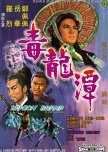
This review may contain spoilers
Cheng Pei Pei played two roles in the wuxia Dragon Swamp written and directed by Lo Wei. She was once again joined by Lo Lieh and Yueh Hua in this tale of deception, disguises, death, and a cursed sword. Fan Ying was seduced and betrayed by Tang Da Chuan aka The White Faced General. Her clan confronted them after she helped to steal the Jade Dragon Sword for her husband. Tang ran off with her son when he lost the sword and Fan was sentenced to 20 years in the terrifying Dragon Swamp. Her sifu agreed to raise her baby daughter. Twenty years later we are introduced to the daughter who looks just like her mother on the night the sword is once again stolen! Along with the rest of the disciples Qing Er is sent to find the cursed sword. She will find the thief, be rescued by the Roaming Knight, and meet the fearsome Swamp Master in short order!
At the age of twenty-three, Cheng Pei Pei aptly differentiated the characters of the older Fan Ying and the adventurous Qing Er. Lo Lieh gave a solid performance as the thief and Head of Security for a powerful clan. Yueh Hua roamed in and out of the story as the nameless swordsman still searching for his true love, Fan Ying. I was happy to see Ku Feng show up as an old master, almost unrecognizable in a wild white wig. Huang Tsung Hsun played the despicable Tang Da Chuan who had a habit of abandoning and murdering his wives in his quest for ultimate power.
The sword fights were standard for the era, with one fight between Pei Pei and Lo Lieh and a host of others almost looking like a dance from a sword fighting musical. If it’s a Cheng Pei Pei film it needs a fight at an inn and this film came through. Qing Er faced off against an assortment of assassins as she ordered her dinner including ones played by Simon Yuen, Fan Mei Sheng, and Han Ying Chieh.
Where the film struggled was the execution of the story. Characters wandered in and out. The cursed sword comically changed hands numerous times. On the positive side, the sets and scenery were all eye catching, including the Dragon Swamp. The special effects were for the most part average for the time. It was fun how they made the sword glow green. The masters were able to practice some magic and Pei Pei had a nifty party trick with drinks. The only area where the special effects were truly lacking was the boat trip through the swamp where there be dragons. Gojira’s creators did a better job with those effects from the same time period.
Despite some of the story and effects shortcomings Cheng Pei Pei lit up the screen as she always did. Her turns at both the mother and daughter were well done. Though flawed, the movie was entertaining. If you enjoy old martial arts films, this is one worth trying.
14 Dec 2023
Was this review helpful to you?
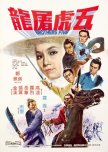
This review may contain spoilers
"It will be invincible!"
Brothers Five was a Shaw Brothers extravaganza featuring Cheng Pei Pei, Lo Lieh, Chang Yi, Chin Han, Yueh Hua, and Kao Yuen. Unlike some of the SB movies with visibly break-away sets and cheap costumes, the sets, costumes and scenery were all high quality for the genre.Yan Hsing Kung (Cheng Pei Pei) is on her way to the Tenglong Villa aka The Flying Dragon Villa when Kao Wei stops the driver of her carriage from whipping the horse and man who rented it to him to death. Turns out he is one of the 5 Kao brothers (#4) who were separated when they were young after their father was murdered by the current owner of Tenglong. Each brother has a horizontal scar across his hand so that they would be able to recognize each other. Yan’s father had saved the boys with each one of them going to a different place to live. Yan has been searching for them to bring them together. Brother #2, Kao Hao, had become a blacksmith with no martial arts skills but could swing a mean hammer. He enters into a fight with Tenglong men and heads to the Villa for personal revenge. Brother #1, Kao Chih, a scholar from Shaolin, runs afoul of Tenglong minions in town and also makes his way to the villa. Outnumbered and outmatched the two brothers are saved when Yan intercedes. Brother #3 owns an escort service which is ambushed on his way to the temple to meet up with Yan. Yan was only to stop one brother from attacking Tenglong Villa by himself which became repetitive, even comical after a while. Finally, #5 Kao Hsia, turns out to be a flamboyant thief who robs from the rich. Now the band is all together and introduced to each other. The five are not skilled enough on their own to take down Lung and his Golden Sword. Much to their amazement, Yan has a secret manual that describes the Invincible Five Tigers as One move! What luck! There are exactly five brothers!
The cast was amazing. The heroes and villains, with the exception of Kao Yuen, gave strong performances. Lo Lieh was a delight as the impish thief. Cheng Pei Pei was charismatic as the woman who fulfilled her father’s vow to find the brothers, reunite them, and point them in the direction of Lung to avenge his old friend’s death. Tien Feng as the Big Bad could always be counted on to turn on the menace. Wang Hsieh and Ku Feng joined him as creative weapon carrying baddies.
Sammo Hung had a tiny part as one of the escort members. He also choreographed the fights along with Simon Chui. Many of the numerous fights were filmed at a distance and involved large numbers of men fighting one or two heroes. For 1970 the sword fights looked quite good and I liked that they weren’t move two steps, cut, edit, add another sequence. You could see some misses and the actions could be slow at times, but overall, the actors were required to remember complicated choreography while fighting in large groups, in long unedited shots, with a variety of weapons being used. Copious amounts of blood also flowed, not Chang Cheh amounts, but enough to make it look realistic. Cheng Pei Pei is one of my favorite female kung fu actors. Not only could she move well and sell the action, she could also act which was not always common in this genre. I loved that she came to the men’s rescue on more than one occasion. Chang Yi was the strongest fighter of the heroes even if his acting wasn’t as strong as Lo Lieh’s. Lo had a particularly funny and heroic encounter when he first visited the Villa. This cast was huge, and the number of recognizable stuntmen from the credits was staggering. Most of the fights were large groups and the stuntmen sold the action-flipping, flying, and getting slammed to the ground. Trampolines and wire work were utilized with the wire work not always appearing fluid. The weakest element of the fights was the Invincible Five Tigers as One skill. It was laughably bad, as in I laughed hard when they finally used it.
Brothers Five would have gone down as one of my favorite old kung fu movies except for what seemed like a counterintuitive reason---the fights were too long. As each brother was introduced, each had to fight a gang of men in long drawn-out battles. After the second fight it began to wear thin. Clocking in at around 100 minutes, the majority of the time was used for these protracted fights. Had they trimmed the fight scenes I would have rated this much higher. The cast alone was like catnip to me. For fans of old martial arts films, this is definitely one to try. Even with the redundant fighting at the villa’s gate it was an entertaining movie.
12 Dec 2023
Was this review helpful to you?
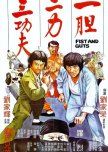
This review may contain spoilers
Fists and Guts was a frustrating combination of inane comedy and entertaining, well-choreographed fights. How much you enjoy this film may depend on your ability to tolerate slapstick and haphazard storytelling. Gordon Liu in a terrible wig worked with two inept conmen to try and recover family heirlooms stolen by a treacherous housekeeper. The conmen were played by the director Lau Kar Wing and usually bad guy Lee Hoi Sang. The story wandered around even going so low as to have the conmen travel to a leper colony. The story itself was redundant as they searched for the “housekeeper” who could disguise himself, with Team Inept choosing the wrong people or being led astray by the real thief. Most of the pointless endeavors were designed to highlight the comedy which fell flat for me.
Just past the halfway mark the fights kicked into gear, if not the story. You had to slog through a gross poop scenario to get that far though. Gordon Liu and Lai Kim Hung had an inventive silent fight as they both tried to steal a jade Buddha from a general’s well-guarded home. They stifled cries and prevented vases and furniture from crashing to the ground as they engaged in a desperate fight. Later, Gordon had to teach the two conmen moves that would help them beat the booby-trapped system in the “housekeeper’s” secret lair. This was one of the few times the fools came in handy. The highlight of the film was the life-or-death fight between Gordon and Lo Lieh. By this time the real identities of both men and their motivations were revealed and the ridiculous wigs were removed. This was one of Lo’s best fights I’ve seen, Gordon and the Laus brought out the best in him. The moral of the tale wasn't as righteous as they might have thought it was.
The story was aggravatingly circular and the comedy could be irritating, albeit those who love old kung fu comedies may be enraptured by the comedy in this film. Regardless of your threshold for slapstick, if you enjoy kung fu movies from this era, the second half of the film shone through with at least two worthy fights to watch.
6 Dec 2023
.
Was this review helpful to you?
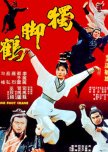
This review may contain spoilers
A knife in her sole or soul?
One Foot Crane was a watchable Taiwanese martial arts movie, but didn’t have anything to make it stand out. Lily Li’s One Foot Crane started out on a revenge rampage of her own, but as often happens in female led movies, before it was over she had to share the screen with male counterparts to take down the villain.The child, Fong Lin I, was presumably the only Fong family member to survive a massacre by the Four Outlaws. Seemingly overnight she grew up and became a martial arts expert. She begins her revenge rampage with Outlaw #1 making an enemy of his son. After dispatching Outlaw #2 at an inn, she’s forced to fight the son where she barely escapes after being wounded. She’s rescued by a nice, but mostly useless woodsman. Fortunately, Capt. Chow was sent to help her and he has a magic elixir to heal her which he gives to her upon discovering her hiding place. Family secrets are revealed and ultimately Fong will have to join forces with Chow and her newly revealed brother in order to take down the baddest of the outlaws.
This was a by the book kung fu tale that has been done a dozen times. It helps to have charismatic actors and creative choreography to elevate the standard material. One Foot Crane was largely lacking in that department. Lily Li didn't have the skill and personality of actresses like Angela Mao and Cheng Pei Pei. She was undeniably beautiful but the fights slowed dramatically when she was involved or they were absurdly under cranked. Miao Tien and Lo Lieh were killed off early in the movie leaving the villains not only short-handed but also without a truly sinister leader. Barry Chan managed to insert some energy and swagger into his character. Szema Lung as the police captain was dreadfully dull. Tsai Hung as the Big Bad came across quite vague for a murderous rogue.
If the story and acting are lackluster, the fights need to be spectacular. Sadly, the movie underperformed in that department as well. Most of Lily Li’s fights were close to kung fu posing and not very fluid or graceful. Szema was slow as well. Barry Chan and Tsai Hung were the most entertaining when they were fighting each other as the moves flowed better and were quicker. Too many hits overall missed during the fights with stuntmen flying backwards on their own. There was some wire-fu, mostly in the trees. The fights would often go from being indoors to a desolate quarry or sandy plateau instantaneously. There was a lot made out of the good guys using Crane, Mantis, and Eagle styles, but they felt more like Sloth and Snail styles. At least they knew if they couldn’t be quick to hit the vulnerable parts---eyes, temple and throat. One Foot Crane also had a knife that she could release out of the middle of the sole of her shoe which was physically impossible, more so than a lot of kung fu gadgets.
Lily Li and Barry Chan were attractive and likeable enough making One Foot Crane watchable if not memorable. As usual, I grade these old niche films on a curve.
5 Dec 2023
Was this review helpful to you?
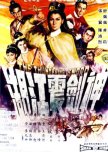
This review may contain spoilers
Cheng Pei Pei in a melodramatic sword romance
Cheng Pei Pei was an ethereal killing machine in The Thundering Sword. What started out as a standard martial arts movie in 1967 quickly evolved into a romantic melodrama only with the stereotypical roles reversed.Chang Yi and Lo Lieh belong to a sect that believes martial arts are for healing, not killing. The Thundering Sword is a sword that can break all others and their leader Tien Feng sends them on a quest to find it so that the dangerous weapon can be destroyed. Chang Yi comes upon Cheng Pei Pei as she dispatches a handful of villains who had made the mistake of attacking her. Chang Yi reprimands her for killing them which she doesn’t take too seriously even as she is instantly smitten with the righteous fighter. Later that night she stumbles across Lo Lieh who had survived numerous deadly traps to recover the Thundering sword. She steals the sword when he’s not looking and throws three poisonous darts into his chest for his troubles. When she realizes he is a sword brother to Chang Yi she takes him to an escort service to have him carried home where he must be treated within three days. After receiving 5000 pieces of silver the escort service promises that they will deliver him or die. On the road to the temple, perma-smirk Chen Hung Lieh thinking the group must be protecting the sword, attacks the convoy with Cliff Lok at his side. He awakens Lo Lieh only to torture him and leave him for dead. When Pei Pei realizes the escort agency failed, she returns to collect their debt…to be paid with their lives. Around 30 bodies later she leaves just as Chang Yi arrives, quickly followed by Ku Feng who accuses him of the mass murder. Pei Pei and Chang Yi reunite and marry which antagonizes Chang’s jealous sect sister made worse when she discovers that Pei Pei was the reason Lo Lieh was poisoned and crippled. When Chang Yi is captured and tried for the escort deaths, Pei Pei tries to tell anyone who will listen that she was the perpetrator.
I recapped the story to bring up a point that I thought was interesting. In old martial arts movies, men fought for a hundred different reasons and dying at the point of a sword or by an iron fist was not unexpected. Somehow when a woman was defending herself and killed the bandits, it was harshly judged. In this movie, the sect at the Baiyun Temple where Chang Yi and Lo Lieh trained were taught not to kill. Pei Pei at the Centipede/Caterpillar sect, was not taught those same rigorous morals. Her first impulse tended to be to lash out, especially toward her poor loyal maid. The fights were largely the swipe and fly backwards style although there was the occasional imbedded sword in a body or dismemberment. At one point in a long scene Pei Pei went behind a curtain with a stuntman playing her coming out the other side in order to do some acrobatics. Ever fierce and graceful whether wielding a sword or a whip, Pei Pei was entertaining to watch. Chang Yi and Lo Lieh didn't have to learn much fight choreography because they scarcely lifted a sword.
Cheng Pei Pei gave a wonderfully complex performance as the ferocious fighter and also as the tender, concerned lover. Chang Yi in a rare hero role was unable to sell it, coming across rather stiff. I wish that Lo Lieh had been given that role instead as he had little to do in this film. He had great chemistry with Pei Pei in Golden Swallow and could have given a deeper performance than Chang Yi. Both Chang Yi and Lo Lieh would end up typecast as villains within a few years. Tien Feng played his share of bad guys as well. Despite their limited time and success, it was fun seeing these ‘heels’ playing ‘faces’. Also worth noting, the music and cinematography for this category of film was quite good.
If you’re looking for one of Cheng Pei Pei’s more traditional sword-fighting roles, best to skip this one as it devolved into a very melodramatic romance with little fighting in the second half. What was worth seeing for me was Pei Pei’s opportunity to shine in a more diverse emotional role.
11/30/23
Was this review helpful to you?
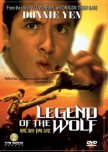
This review may contain spoilers
"You have your one chance, you don't get a second"
Legend of the Wolf marked Donnie Yen’s first official directorial credit. He was also a writer, martial arts director, and producer for it. The action was fast, furious, heads flying, and blood spurting violence, briefly interrupted with a blossoming friendship and old love.When a young man discovers the legendary Wolf is still alive, the Wolf’s associate, Wai, takes him to the old man. Ben Chan wants him to kill someone. Before the Wolf agrees, he tells the eager youth that he has to listen to a story…Not long after WWII, Fung Man Hin stumbles across Brother Wai in a run-down village on his journey to find the Seven Saints Temple. Wai and the villagers decide to con or steal as much money from the stranger as they can. On the way to the temple the two men are attacked by machete wielding bandits. Man Hin dispatches them, saving Wai’s life in the process. Later, Man Hin takes on several bandits at the temple and is wounded in the process. Wai carries Man Hin to a shack where Wai Yee attends him and just happens to be the woman who has been waiting for him for seven years. Her lover has no memory of her for he is suffering from the old trope of amnesia. When the worst gang of bandits led by Ben Lam arrive at the village looking for him all hell breaks out and deadly secrets are revealed.
Legend of the Wolf was decidedly low budget. Most of the fights took place in the woods or by the ocean much like an old school Taiwanese kung fu flick. The few buildings were scarcely standing. The story, especially the romance, was ill developed. Because he couldn’t remember Yee, it came across one-sided. His past and Yee’s with the bandits was glossed over. Instead of a grand romance, the writing pointed to the fact that she was a completely devoted girlfriend and disposable character. The quickly developed friendship with an energetic Dayo Wong as Wai was better developed than the romance.
Yen tried to make the film artistic in the present time, utilizing blue, green, and red lights to highlight every scene with different camera angles. Whether in the present or the past he kept the camera up close so that you could count every pore on an actor’s face, even during fight scenes. The exception to the rule was the earliest fight which was filmed in the dark leaving much to the imagination. By having considerable amounts of the movie's action filmed up close, most of the hits and kicks were shrouded. He also over cranked many of the fights causing the movements to fly by in fast motion. When Donnie wasn’t fighting, the action was abysmal, the kind of fights almost anyone could look like a martial arts expert the way they were edited.
There were some unintentionally funny scenes. When Donnie was chasing down the bandits and hit two rocks at them several guys fell down. The same thing happened when he threw a bamboo stick. One bandit used a revolver that obviously held 6 bullets, but could shoot 20 times before needing to reload! The last few fights were better than some of the others, but were still filmed too close to catch the full moves. Ben Lam belonged to Jackie Chan’s stunt team which should have freed Yen to show the fight from enough distance to capture all the moves, but too often the hits and kicks were obscured with the camera practically sitting on their noses. There were segments of the fights that were highly entertaining when they weren’t blurred or sped up. Something I haven’t seen before in a kung fu movie was Donnie using a machete like a rock and skipping it across a creek. A purely shallow viewpoint---Donnie looked lean and mean and cut to shreds as he fought the bandits.
Legend of the Wolf wasn’t a horrible first directorial attempt, but it tried to be more than it was and failed. Donnie Yen is nearly always entertaining to watch, but this film might be more for fans of the genre and era as long as they set the bar low going into it.
11/25/23
Was this review helpful to you?
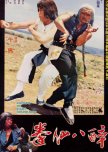
This review may contain spoilers
Too punch drunk to know it's not drunken
In 1980, Kung Fu of Eight Drunkards attempted to capitalize on the success of Jackie Chan’s Drunken Master. Unfortunately, they did so without the martial arts skills of the former or the charismatic performers and were left with a below average kung fu flick.Chang Fung (Mang Fei) took some time off of working at his uncle’s restaurant to train with a drunken master named Wu Sing (Lui Ming). At first it doesn’t appear he’s learned much but a chance encounter with a mischievous Monkey (Wu Ma) reveals to the world that he has learned Wu Sing’s style of fighting. Word gets back to the Four Bandits, the biggest and baddest played by Chan Sing. The bandits are determined to end Wu Sing for causing problems with an old deal gone wrong. Lung Fei, Henry Lu, and the Gold and Silver Tigers go up against the newly trained kung fu artist to their detriment. Ultimately it will come down to Mang Fei confronting Chan Sing. As always, it’s all fun and games until Chan Sing takes off his shirt to show he means business.
There were numerous problems with this movie, but primarily Mang Fei was too stiff to even mimic the drunken style. Lui Ming came across as incoherent bypassing sloppy drunk altogether. I kept waiting for Mang Fei to use the drunken style but most of the fights were more kung fu posing than anything. The choreography was lacking in any creativity. The fights were already slow enough but then the director added slo-mo to a couple of them making me wonder if he was trying to go back in time. The deadly confrontation with Lung Fei was filmed in the dark hiding most of the action. Chan Sing can always be counted on to bring it even when he’s only briefly in the movie. Other than his fight in the finale, only Wu Ma with his moth-eaten wig brought any life to this lackluster movie.
Kung Fu of Eight Drunkards made the cardinal sin of a kung fu movie---the fights were uninteresting and bad. Also, if you name a movie after a particular style, it darn well needs to show up in it.
11/20/23
Was this review helpful to you?

This review may contain spoilers
A Nation of Banchan was an interesting look at Korea’s culture of rice and side dishes. Just like the greetings and farewells, “Did you eat?” and “Don’t skip meals” this special begins and ends with delicious meals. Heo Young Man, Ryu Soo Young, and Mimi travel across Korea eating at world class restaurants, restaurants run by ajummas, and places in between. Rice, fermented food, and seasonal ingredients are all explored.Banchan begins with the heart of the Korean meal---rice. The oldest rice seed was found on the Korean peninsula dating back between 13,000 and 17,000 years and the cultivation of it is still going strong. Approximately 3000 different rice brands are sold and instant rice has risen in popularity as well. They dine at a restaurant that specializes in serving rice in a variety of forms-chestnut porridge, alcohol, steamed, and noodles to name a few.
Side dishes are said to reflect the affection and generosity of the people. The cast travels to a restaurant run by women who have worked there for 20 years. The women bring in a sagging table that contains 24 side dishes. Then they brought in several more! The team barely made a dent in discovering different side dishes as Korea boasts more than 1500 types.
Next, they tackle wraps where anything edible is placed inside a leaf and eaten. Ssam dates back to Goryeo times. The leaf “embraces all ingredients.” They also tour where soy sauce is created and show a variety of jangs used to flavor foods.
The trio visits a Bibimbap restaurant next. Bibimbap is the food that shows “sharing and uniting the culture.” Whether using raw veggies or steamed, cooked meat or raw, it appears a practiced stir is needed.
Fermentation is investigated, the third style of food preparation---waiting. A food researcher is schooled by an old guru in how to make Jeotgal. At the fishing village the older woman demonstrates how fish and other seafood are salted and stored.
Episode 2-Seasonal Ingredients
“We can’t eat what’s grown in spring in summer…We can’t miss the time.”
Winter: Oysters are a winter staple and were cultivated in Korea going back 600 years. The trio goes to an oyster bar where they don protective gear to cook oysters on a grill at their table. They are also served oyster salad and pancakes.
Spring: In a country that is 70% mountainous, there is a long history of foraging for wild greens. They have lunch cooked by an older woman with nearly all of the ingredients either grown or found by her. Fried Acacia flowers, acorn jelly, and numerous wild green dishes are served with rice.
Summer: In a Bamboo forest, the three are treated to a feast cooked in a long bamboo tree called a “Steaming Dragon.”
Autumn: Rare pine mushrooms only found in the Fall for around 2 weeks are featured in an assortment of dishes at an upscale restaurant that Ryu goes to. Mimi is treated to seasonal raw fish at another high-end restaurant. Heo goes in the other direction to a small place that serves aged kimchi chicken stew. “Food that’s been aged a long time, like me, tastes better.”
I can’t say that all the dishes and styles of preparation made my mouth water, but I did enjoy how the meals were “built” and the history behind them. With the exception of a couple of places, it helps to be an omnivore as there were numerous meat dishes fermented or served. The three hosts were engaging and the two older ones informative. Mimi provided the wide-eyed wonder at discovering new flavors as a stand-in for the audience. Banchan means that a surprise guest isn’t a burden as there is always room for another at a table with plenty of side dishes. Korean meals are interpreted as a mother’s love, I think most mothers would approve of the love and dedication required to film this show about how seasonal ingredients and age-old methods are combined to nourish and strengthen those lucky enough to share a meal lovingly prepared.
11/1/23
Was this review helpful to you?

This review may contain spoilers
Mega Crocodile’s producers must have crunched the numbers on their calcugators and decided to utilize the most over-used stereotypes in monster movie history for this story about a rescue attempt on an island covered in enormous crocodiles. When the fearsome crocs weren’t terrifying the search party, the creepy crawly inhabitants scurrying about dug in to make for gruesome sightseeing experiences.After young biologist Zi Hao and his boat used for scientific research go missing near Hell Island, his sister Ming Zhu asked Luo Han for help rescuing him. Luo, an alcoholic with a painful past was the only person to have ever escaped the island alive. A noxious place with 3000 crocodiles and plagued with poisonous gas, the drunk basically responded that one does not simply walk into Hell Island. As all heroes do, he refused her then immediately sobered up and agreed to the perilous mission. Luo, headstrong Ming, money guy/comic relief Pan, and three aggressive foreign bodyguards jumped out of an airplane sans parachutes and began their deadly island adventure. They encountered body parts, deadly insects and plants. Oh, and the mother of all crocs, a ginormous creature with infrared vision.
The CGI alternated between good and poor, much as the acting did. Li Guang Bin managed to pull off the world-weary hero with a crossbow look, although I never understood why he used it when machine guns had no effect on the great toothy beast. I admit to being grossed out about the two different kinds of burrowing bugs the team came into contact with. The other squeamish moments were the finding of dismembered body parts lying about on a regular basis
The story itself was obvious from the opening shot, not that these kinds of movies innovate much. It’s all in the execution and this one just felt like a low-grade B movie which wasn’t very fun or terrifying. I wrestled with how to rate a movie about a bus-sized crocodile. Overall Mega Crocodile wasn’t jawsome, but it didn’t completely bite either.
10/26/23
Was this review helpful to you?
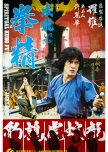
This review may contain spoilers
5 > 7
Five red-headed ghosts visited Jackie Chan in Spiritual Kung Fu. In this kung fu flick there wasn’t just one secret kung fu book, there were two!Long Yi Lang is the dull, mischievous, often bordering on unlikeable, student at the shaolin temple. One night a thief sneaks into the temple and steals the forbidden Seven Deadly Fists book. The Luk family took it in their plan for revenge against the monks for preventing the father from becoming the Wu Lin leader a decade before. Using the techniques in the secret book, the Luk son will be able to eliminate the competition and gain the leadership role. The only counter to the Seven Deadly Fists style is the Five Style Fists and that book has been lost. Right on cue, a sparkler from heaven crashes into the temple library depositing 5 red-headed ghosts who just happen to reveal where the Five Styles secret book is hidden and begin training Yi Lang in Dragon, Snake, Tiger, Crane, and Leopard styles. Meanwhile, the Luk son studies his book and begins killing off his competition. The inevitable duel between the two men will determine whether 7 is greater than 5 in a kung fu battle.
Jackie Chan’s Yi Lang was more irritating than funny or endearing. When the fights started in earnest, the mugging for the camera and whining finally stopped. James Tien often played a bad guy as he did in this film. Dean Shek and Wong Ching both played comic relief buddies to the two fighters. Wu Wen Siu had the rather thankless job of being the only female in the cast but made the most of it when fighting Jackie and James. I deducted points for the spanking scene she had to endure that detracted from the film for me.
The beginning of the film was slow and the humor decidedly low brow. One low point was when Jackie was putting live frogs and an eel into his pants. Some of the characters integral to the first half of the story all but disappeared during the second half. Maybe they had to rush to do another kung fu movie being filmed. The movie improved when the ghosts dropped into the temple and shook things up. They were funny but the first encounters with them became repetitious as if the director needed them to fill time, especially when he resorted to fart and urination jokes. Jackie choreographed the fights. They weren’t as slow as some of his earlier efforts, but were still indicative of the time and nothing like his more inventive fights he would create later on. It took nearly half the movie to begin the fighting. The pole fights were interesting when he had to fight the 18 Lohans though like the ghost scenes went on too long. Jackie and James’ duel was entertaining as was the fight with the secret Luk father, which didn’t take a genius to figure out early on. Jackie showed off the five styles with a minimum of wire and trampoline work.
Once the training and fighting began, I started to enjoy this film. The clownish mute ghosts in their tutus were low tech but their antics were engaging most of the time. When watching an older Jackie Chan film like this one, it helps to remember that this was near the beginning of his starring roles and his comedy and fight choreography would evolve.
10/23/23
Was this review helpful to you?

This review may contain spoilers
Too much talking, not enough monster
If you saw The Rock’s Scorpion in The Mummy 2 and thought, wow!, that’s amazing CGI, you may be impressed by the brief appearances of the Scorpion Monster in this film. The synopsis said the film was based on a famous Taoist monk, but he never made an appearance in this story. There was Ye, a self-absorbed officer for the Monster Killing Bureau and Yan, a self-absorbed monster hunter who was ordered to help Ye by the imperial court.Yan had consumed the power of a Red Wolf demon and managed to bring her into human form. Ye and his two cohorts dropped by and ordered Yan to help them find the missing Yue Ling village. Ye feared the Scorpion Monster was at fault for the village’s disappearance. When they finally found Yue Ling they discovered the villagers were indebted to the Scorpion Monster who had saved them and wished to live in harmony with him. Neither Ye nor Yan believed that was possible even though Yan and the wolf demon had become close. In the shadows, was a mysterious woman who whispered into Ye’s ear (repeatedly) that Yan was responsible for his father’s death and if Yan absorbed the scorpion’s powers, the emperor would make him a state preceptor instead of Ye. In the end, it would be a struggle to see who would conquer or kill the scorpion and what would become of the villagers.
The above bland description of the basic premise of the story was actually more entertaining than watching this plodding movie. A movie with the title Scorpion Monster, should have some exciting scorpion scenes. There was very little Scorpion Monster in the movie, and probably for the best as the CGI was quite poor. The acting was on par with the CGI. The writing was substandard, dull, and quite repetitive for a movie that ran less than 90 minutes. Eighty minutes into it I was wondering who I was supposed to be rooting for aside from the monsters. And the final battle was the definition of anticlimactic. I actually said out loud, “Was that it?”
Normally, I would try to think of something positive to say about a movie for those who might possibly be interested in it even if I wasn’t. But with below average acting, writing, CGI, and fights, it’s hard to recommend. If you get a kick out of watching a cheaply made monster movie that only shows the monster briefly a couple of times, this might be for you, otherwise best to skip this one or get stung.
10/17/23
Was this review helpful to you?
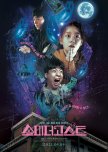
This review may contain spoilers
Not Fab-boo-lous, but not completely boo-ring either
Show Me the Ghost failed to break any new ground in the Ghost Whisperer genre. If they’d trimmed the film by 20 minutes and tightened up the story it might have made a good episode in one of the many ghostly dramas dedicated to the same theme.Ye Ji and Ho Doo are friends dating back to childhood. When Ye Ji fails yet another job interview she casts her troubles on her friend reminding him that he owes her money. Ho Doo takes her to his new house that is spacious and came completely furnished and as they would find out later, complete with its own ghost. Unable to break the contract the two determine to either fob the apartment off on someone else or drive the ghost out.
The plot was threadbare and I knew within five minutes exactly where it was going. Some of the scenes felt incredibly forced. It was billed as a comedy and that was a reach unless you find Han Seung Yeon’s relentless screaming and ear-piercing fake crying hilarious. There was only one segment involving four pair of shoes that made me chuckle. Kim Hyun Mok’s performance was as understated as Han’s was shrill. The rest of the cast was adequate but not much more.
For a big fraidy cat like me, this was the perfect kind of ghost story. It wasn’t scary and there was a bittersweet resolution to the haunting. Despite being cursed by an over-used paradigm, with a more imaginative script and compelling acting it might not have been spooktacular, but it would have had more spirit.
10/15/23
Was this review helpful to you?
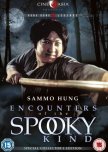
This review may contain spoilers
Sammo takes on a hopping vampire!
Sammo Hung took on all sorts of things that go bump in the night in Spooky Encounters. This was a combination of horror, comedy, and kung fu with mixed results.Bold Cheung’s wife is having an affair with the local wealthy guy, Master Tam. Unwilling to share or be exposed Tam hires Chin Hoi, an immoral priest to kill Cheung by magical means. Chin Hoi’s apprentice, Priest Tsui, refuses to go along with the murderous plot and secretly helps Cheung. Another of Chin Hoi’s apprentices tricks Cheung into spending the night not once, but twice in a locked temple. Not scary, you say? Locked inside is a hopping vampire! When the hopping vampire fails to kill him, the bad guys frame Cheung for the murder of his very much alive wife. Eventually the simple Cheung is convinced that the man he trusts and the wife he loves are plotting to kill him. It will all come down to a no spells barred priest against priest and Sammo against the rest ultimate magical fight.
This is considered a kung fu horror classic and many people love it. I struggled to connect with it. I love a good hopping vampire story and this one scored on that account. But if Sammo is in the movie, I want more action. The first fight didn’t take place until 43 minutes into the movie. And most of the action took place after the 1-hour mark. The story wasn’t compelling enough to keep me interested during the first half. I was happy to see Lam Ching Ying, one of the martial arts directors, have a nice little fight against his own men when they were possessed. Chung Fat played a lot of bad guys early in his career so it was fun for him to play a heroic character. The final fight had Sammo possessed by different characters including the Monkey King. The action and dialogue were cranked high in fast motion. Once Sammo started fighting the film took on more interest for me. Fair warning there were some gruesome images-insects, rodents, a decomposed corpse, and a decapitated chicken.
Encounter of the Spooky Kind was one of the first movies to combine kung fu, comedy, and horror. It started out slow, finally finding its footing. The humor could be hit or miss, but when it came to fighting, Sammo rarely missed.
10/4/23
Was this review helpful to you?
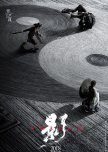
This review may contain spoilers
"Never have I witnessed the beauty of the world"
Zhang Yi Mou is renowned for his use of brilliant colors and vibrant scenery. In Shadow he showed he could strip it all away and lay bare the story in a gray and white world. The story that seems simplistic at first peels away layer after layer revealing desire, betrayal, and greed.Two kingdoms have signed a peace treaty but only the Yans have control of the great walled city of Jing. The Pei clan yearns to reclaim Jing City against the wishes of their king who wants to keep the peace at all costs even if it means wedding his sister to the Yan heir. The Pei Commander has challenged General Yang to a duel, one he doesn't believe he can win with the winner claiming the city for his clan. The Pei king strips the Commander of his rank for putting the peace at risk, reducing him to a commoner. Early on it is revealed that the Commander is only a shadow named Jing. The real Commander stays tucked away in an underground cave slowly dying from a wound rendered by the Yang general. Soon the characters set up the play they wanted, never knowing if they were the puppet master or puppet.
Shadow's dark underlying mood reminded me of an emotional mash-up of Kurosawa's Kagemusha and Throne of Blood. Jing had grown up in the darkness and even in the light was someone else's shadow. Aside from the Commander's wife, was there something else he desired? The Commander (like a good Kurosawa character) had gone nearly mad trapped below ground scheming and planning. Deng Chao played both characters so well I could scarcely tell they were the same person. Madam was torn between her loyalty to her husband and her feelings for Jing. Other than his longing for Pei to reclaim Jing City, Capt. Tian's loyalty was murky at best. Was Pei's king short-sighted or playing the long game? Characters with the greatest conceit would pay the greatest price. Zhang Yi Mou took his time revealing the hidden truths beneath the characters' facades.
Zhang may have stripped his palette of bright colors but the film was no less stylistic. Though the film at first glance appeared monochromatic, he judiciously used color---patches of green on the hills, the luminous glow of skin, the golden heat from candles, warm brown tones in the Yin and Yang and of course the crimson flow of blood pooling in the rain. His use of color and architecture were, as always, a wonder.
Umbrellas are no stranger to kung fu movies. Zhang, however, took them to new heights. One scene with the army sliding down the cobblestone street doubly armed may have defied gravity but not wuxia magic. The fights were brutal and deadly. Ku Huen Chiu has an impressive track record as a martial arts director and his work here was exemplary. One fight managed to combine dangerous combat into an erotic dance. Feminine moves were created to combat masculine ones to great effect. A surprise knife or sword to the neck always works, too. The great battle accompanied by a zither duet was reminiscent of Hero and just as effective.
The climax dragged on as the endgames became apparent and who would ultimately come out on top was left up to the viewer to decide. Shadow was at its heart a martial arts film complete with betrayals, schemes, lust, and revenge served on a blood-soaked platter. Few directors could create a more aesthetically pleasing film or take an old genre and make it feel new. Zhang Yi Mou is one of my favorite directors for being able to do all that and more. Shadow's breathtaking use of color and creative cinematography was the perfect setting for the ancient story of man's pyrrhic need for power.
9/26/23
Was this review helpful to you?

 35
35 110
110 7
7





















